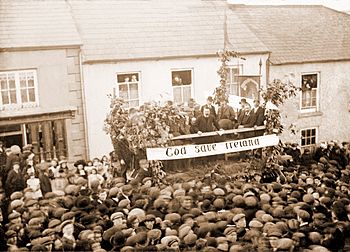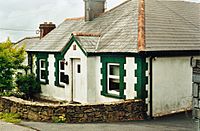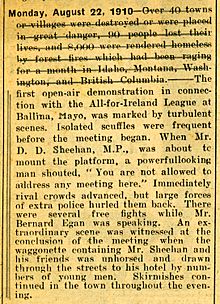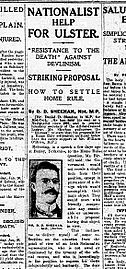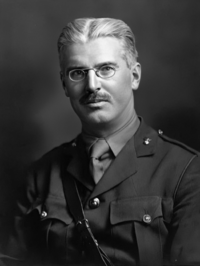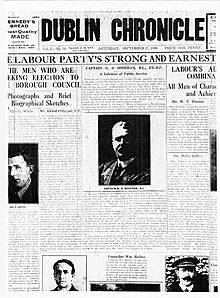D. D. Sheehan facts for kids
Quick facts for kids
Daniel Desmond Sheehan
|
|
|---|---|
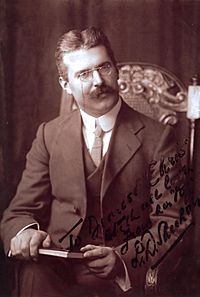 |
|
| Member of Parliament for Mid Cork |
|
| In office 17 May 1901 – 14 December 1918 |
|
| Preceded by | Charles K. D. Tanner |
| Succeeded by | Terence MacSwiney |
| Personal details | |
| Born | 28 May 1873 Kanturk, County Cork, Ireland |
| Died | 28 November 1948 (aged 75) London, England |
| Political party | Irish Parliamentary Party, All-for-Ireland League |
| Spouse | Mary Pauline O'Connor |
| Occupation | Barrister, journalist, author |
| Military service | |
| Allegiance | |
| Branch/service | British Army |
| Rank | Captain |
| Unit | Royal Munster Fusiliers |
| Battles/wars | World War I |
Daniel Desmond Sheehan, known as D. D. Sheehan, was an important Irish nationalist leader, politician, and writer. He was born on May 28, 1873, and passed away on November 28, 1948. He worked as a journalist and later became a barrister, which is a type of lawyer.
From 1901 to 1918, D. D. Sheehan was a Member of Parliament (MP) in the House of Commons of the United Kingdom. He represented the Mid-Cork area in Ireland. He helped create and led the Irish Land and Labour Association. This group worked hard to improve conditions for farmers and workers.
Sheehan is remembered for his success in changing land laws, improving worker rights, and building state housing in rural areas. He also helped lead the All-for-Ireland League from 1909. This group wanted all people in Ireland, no matter their background, to work together. During World War I, he served as an officer in the British Army in France. After the war, he became an editor for a newspaper in Dublin.
Contents
Early Life and Journalism
Sheehan was born in Dromtariffe, near Kanturk, in County Cork, Ireland. His father was a farmer and a supporter of Irish independence. When Daniel was seven, his family was forced to leave their home. This happened during the Irish Land League's Land War, when farmers protested against unfair rents.
This experience made Sheehan a strong supporter of Irish nationalism. He believed in Charles Stewart Parnell, a famous Irish political leader. Sheehan started working as a schoolteacher at 16. He also began writing for newspapers in 1890. He taught himself a lot about law and writing.
He worked as a reporter for the Kerry Sentinel and the Cork Daily Herald. After getting married in 1894, he moved to Scotland and then England for his journalism career. He worked for the Glasgow Observer and the Catholic News.
In 1898, Sheehan returned to Ireland. He worked for various newspapers, including the Cork Constitution. From 1899 to 1901, he was the editor of The Southern Star. In this role, he made sure that reports from the Irish Land and Labour Association (ILLA) were published. This helped the ILLA and the United Irish League grow in Cork.
Leading the Land and Labour Movement
Sheehan became involved in labour and trade union work early on. He wanted to help workers escape poverty. He wrote, "I was engaged in an attempt to lead the labourers out of the poverty and misery that encompassed them."
In 1894, the Irish Land and Labour Association (ILLA) was formed. It aimed to help small farmers and farm workers. As chairman of the ILLA, Sheehan worked with J. J. O'Shee, an MP from Tipperary. They pushed for big changes to land and labour laws. They especially wanted small plots of land to be given to rural workers.
Sheehan believed that change could happen through political action, not violence. He saw how badly farm workers lived. They often lived in tiny, unhealthy cabins. He said, "Those of us who had taken up the labourer’s cause . . . went our way building up branches, extending knowledge of the labourers' claims, educating these humble folk into a sense of their civic rights and citizen responsibilities."
Under Sheehan's leadership, the ILLA grew quickly across Munster and Connacht. By 1900, he had helped start almost 100 ILLA groups. These groups fought for the rights of small farmers and improved conditions for rural workers. By 1904, there were 144 ILLA branches.
However, many middle-class people, including farmers and shopkeepers, did not like the labour movement. The main Irish political party also did not want the ILLA to have its own representatives in Parliament. They wanted to keep control over national politics.
Becoming a Member of Parliament
In 1901, there was a special election in Mid-Cork. Sheehan ran as the ILLA candidate, focusing only on workers' issues. He won the election on May 17, 1901, becoming an MP. He was carried out triumphantly after the vote. He wrote that his win was "a tremendous triumph for the Labour movement."
At 28, he was one of the youngest Irish MPs. He was also very outspoken. Even though he joined the main Irish party, he was seen as an outsider. He said his only goal was "pushing the labourers' claims upon the notice of the leaders." However, the party leaders saw the ILLA as a threat.
Helping Farmers and Workers
Sheehan helped solve many disagreements between landlords and their tenant farmers. He played a key role in ending unfair "landlordism" through the Wyndham Land Purchase Act of 1903. This law helped many tenant farmers buy their land. Sheehan helped thousands of farmers in Munster become landowners. He called it "changing rack-rented farmers into peasant proprietors."
Sheehan worked closely with William O'Brien MP. They formed a Cork Advisory Committee that helped farmers buy land at lower prices. In the 1906 election, Sheehan was re-elected without opposition. However, he later had disagreements with the main Irish party. They accused him of being a "factionist" because he supported working with different groups. They also stopped paying him his allowance as an MP.
Sheehan resigned his seat in November 1906 and challenged the party to run against him. He was re-elected on December 31, 1906, as Ireland's first Independent Nationalist Labour MP. From then on, his income came from collections made by his supporters.
Sheehan's Cottages
Sheehan worked tirelessly to improve housing for Irish workers. In 1906, he helped pass the Labourers (Ireland) Act. This law was special because it provided government money for rural housing. Sheehan himself suggested and wrote parts of this law. He believed it would "root the labourers in the soil."
This Act led to the building of over 40,000 small homes, each with an acre of land. About 7,560 of these were in County Cork alone. These homes became known as Sheehans' cottages. Another law in 1911 added 5,000 more homes. These houses provided shelter for over 60,000 landless workers and their families. Before this, many lived in terrible conditions, often sharing one room with their animals.
Within a few years, these changes brought a huge improvement to rural Ireland. Diseases like tuberculosis and typhoid became less common. Sheehan also started a unique co-operative project called the Model Irish Village in Tower, near Blarney. This village had 17 cottages, a school, a laundry, and a community hall. He hoped it would be an example for other parts of Ireland.
These achievements, made with the local Land and Labour Associations, built a strong base for the future labour movement in Munster.
All-for-Ireland League
By 1907, several Irish MPs were outside the main party. There were attempts to reunite the party, and Sheehan briefly rejoined for unity. However, in 1909, Sheehan and William O'Brien left the party again after a very stormy meeting.
After this, William O'Brien and D. D. Sheehan started a new political group called the All-for-Ireland League (AFIL) in March 1909. Sheehan was its organizing secretary. The AFIL believed that Home Rule (self-government for Ireland) should be achieved with the agreement of all groups, including the Protestant minority. Their slogan was "the Three C's": Conference, Conciliation, and Consent. Sheehan disagreed with the main party's leader, who said that Ulster (the northern part of Ireland) would simply have to follow.
Sheehan and O'Brien were very forward-thinking. They suggested giving Ulster many concessions to ease their fears of a Catholic-dominated Dublin parliament. They believed that without this, an All-Ireland settlement would fail. Both Sheehans (D. D. and his relative Canon Sheehan) wrote regularly for the League's newspaper, the Cork Free Press.
Elections of 1910
In 1909, the main Irish party tried to remove Sheehan from his Mid-Cork seat. But Sheehan's supporters quickly stopped their efforts. In the January 1910 election, Sheehan faced an opponent from the main party. Despite being criticized by some Catholic priests for "pitting labourer against farmer," he won with a good majority. He noted that 95% of the votes from people who couldn't read or write were for him.
Throughout 1910, he promoted the AFIL's ideas of working together. The AFIL grew stronger, but this also led to conflicts. Another election was called in December 1910. Sheehan campaigned across Cork, Limerick, and Mayo. He even came under gunfire at Crossmolina. Despite a lack of support from some clergy, he kept his seat. The AFIL won eight out of nine seats in Cork.
During election times, songs and poems praising candidates were common. One such poem, called The Ballad of D. D. Sheehan, was popular in 1910.
Becoming a Barrister
While he was an MP, Sheehan also became a barrister (a type of lawyer) on July 3, 1911. He had studied law at University College Cork and King's Inns in Dublin. He then practiced law in the Munster area.
Home Rule for Ireland
In 1911, the All-for-Ireland Party suggested that Ireland should have Dominion Home Rule. This meant Ireland would govern itself but still be part of the British Empire, similar to Canada or Australia. They sent this idea to Prime Minister Asquith.
Sheehan also worked to promote a federal system for Home Rule. This would mean different parts of Ireland could have some self-government, which he hoped would prevent Ulster from being separated. In January 1914, he published specific proposals for Ulster to join an All-Ireland Home Rule plan. However, the main Irish party rejected these ideas. Later, Sir Edward Carson, the leader of the Ulster Unionist Party, admitted that Sheehan's proposals were good. He said if they had been supported earlier, Ulster's concerns might have been overcome.
In May 1914, the AFIL strongly opposed dividing Ireland. As a final protest, they did not vote on the Third Home Rule Act. This law allowed for the temporary exclusion of six Ulster counties. The AFIL called this an irreversible "partition deal."
World War I Service
Serving in the War
When World War I began in August 1914, Sheehan supported William O'Brien's call for Irishmen to join the army. He believed serving in the Irish regiments would help the Allied cause and lead to an All-Ireland Home Rule settlement.
In November 1914, even though he was 41 and had a large family, Sheehan joined the army. Four other Irish nationalist MPs also joined. He trained in County Cork and became a lieutenant. He helped raise the 9th Battalion of the Royal Munster Fusiliers. In May 1915, he was moved to the 2nd RMF Battalion due to many casualties.
Three of his sons also joined the war effort. One son, at 16, was the youngest officer on the Western Front in 1915. Sadly, two of his sons died serving in the Royal Flying Corps/Royal Air Force. His daughter, a nurse, was injured in a bombing raid. His brother was severely injured, and his brother-in-law was killed in battle.
In 1915, Sheehan organized campaigns to encourage people to join the army in Counties Cork, Limerick, and Clare. In July 1915, he became a Captain and led a company with the 2nd RMF Battalion in France. From 1916, he wrote articles from the trenches for London and Irish newspapers.
He suffered from deafness due to shellfire and ill-health. This led to his transfer to a reserve battalion in County Cork. He was often in the hospital and left the army in late 1917. He was given the honorary rank of Captain. Sheehan received several medals for his service in World War I.
Irish soldiers who died in the war are remembered at places like the Island of Ireland Peace Park in Belgium. Sheehan also honored them in his poem A Tribute and a Claim.
Leaving Parliament
Sheehan continued to speak up for Irish interests in Parliament. In April 1918, during a crisis about forcing people to join the army, he gave a strong speech in the Commons. He threatened to "fight you if you enforce conscription on us."
Sheehan became disappointed that Britain and the Irish Party could not agree on All-Ireland Home Rule. The AFIL members realized that their ideas for a peaceful settlement were being replaced by more forceful methods. So, they decided not to run in the December 1918 general elections. William O’Brien had been working with Arthur Griffith's Sinn Féin movement. Sheehan confirmed that he and other AFIL members withdrew from the election and asked their supporters to back Sinn Féin.
Terence MacSwiney became the new MP for Mid-Cork after Sheehan. Because of the changed political situation and threats, Sheehan and his family moved from Cork to England.
Supporting Labour
In October 1918, during a debate about providing land for Irish soldiers, Sheehan spoke. He wanted the law to pass, even if it only helped a few thousand Irish soldiers who "fought for their country and for the liberties of the world."
Sheehan ran as a Labour Party candidate in London in the December 1918 election. He called for "Land for fighters," meaning land for returning soldiers. He did not win, but his demand was met. The government later created a scheme to provide thousands of cottages for Irish ex-servicemen and their families. His work with the Labour Party helped pave the way for Clement Attlee, who later became a Labour Prime Minister.
From 1920, Sheehan worked as a journalist. In 1921, he published an important book called Ireland since Parnell. This book covered the period from Parnell to Sinn Féin. You can read it online for free. He could not practice law because of his hearing loss from the war. He worked as a literary editor and later as a publisher and editor of The Stadium, a sports newspaper.
New Beginnings in Dublin
After some time, Sheehan returned to Dublin in 1926. His wife passed away soon after. He became the managing editor of Irish Press and Publicity Services. From 1928, he was also the co-publisher and editor of the South Dublin Chronicle, a weekly newspaper. In 1929, the paper was renamed the Dublin Chronicle, with Sheehan as its managing director and editor. The newspaper aimed to be independent and to bring North and South Ireland together. It also focused on land, labour, fisheries, and social issues like slums and housing.
Fighting for the Poor
In 1929, Sheehan wrote a series of articles in the Dublin Chronicle. He described the terrible lives of people living in slums. He wrote about the "Frightful Slums of Dún Laoghaire" and how "consumption takes its toll" in places like Crofton Parade. He also reported on the bad housing in Bray, saying it "would not pass as cattle stables."
He interviewed important figures like Richard Mulcahy, the Minister for Local Government, about how to house poor people. He also criticized the Irish Labour Party for not having a strong plan for farmers or a clear program. He pushed for tax relief for farmers and better housing for workers.
Sheehan also spoke out against articles that criticized Irish ex-servicemen from World War I. He argued that they "fought for liberty, they fought for the freedom of humanity." He said it was "absurd and ridiculous" to claim they fought for England.
In 1930, the Dublin Chronicle continued to highlight important issues. Sheehan called for freedom of speech after a Labour Party meeting was disrupted by shouting groups.
Final Political Efforts
Before the Dublin County Council elections in September 1930, Sheehan held meetings across the area. He emphasized that he was running only to improve the lives of his fellow citizens. He said his record was always linked to Labour. The Dublin Chronicle strongly supported Labour in the election. However, only three Labour councillors were re-elected. Sheehan did not win, as larger parties took over his housing campaign ideas.
The Labour Party faced challenges at this time. They changed their goals to appeal to more people, not just working-class individuals. They also lacked strong local groups. This led to a decrease in their seats in the Irish Parliament in later elections.
In January 1931, the Dublin Chronicle promoted a "Buy Irish Goods" campaign. Sheehan continued to push for solutions to slums and housing problems. He also called for good candidates to run for Labour in the next election. The Chronicle stopped publishing in August 1931 due to the worldwide Great Depression.
From the 1930s, Sheehan could not work as a barrister due to his hearing loss from the war. Instead, he gave legal advice to former constituents. He helped them protect their land rights. He also helped unemployed Irish ex-servicemen from World War I. Many of these men were sons of families he had helped house and recruit. He supported Old Comrades Associations, which helped ex-servicemen. He edited their annual journal, which had the motto "Service – not self." In 1945, he wrote that despite many difficulties, this work had "been carried on with unwearied effort and considerable success."
Sheehan tried to regain his Cork seat in the early 1940s but was unsuccessful. He even offered to run for another party, but his offer was declined.
Personal Life
On February 6, 1894, Daniel Desmond Sheehan married 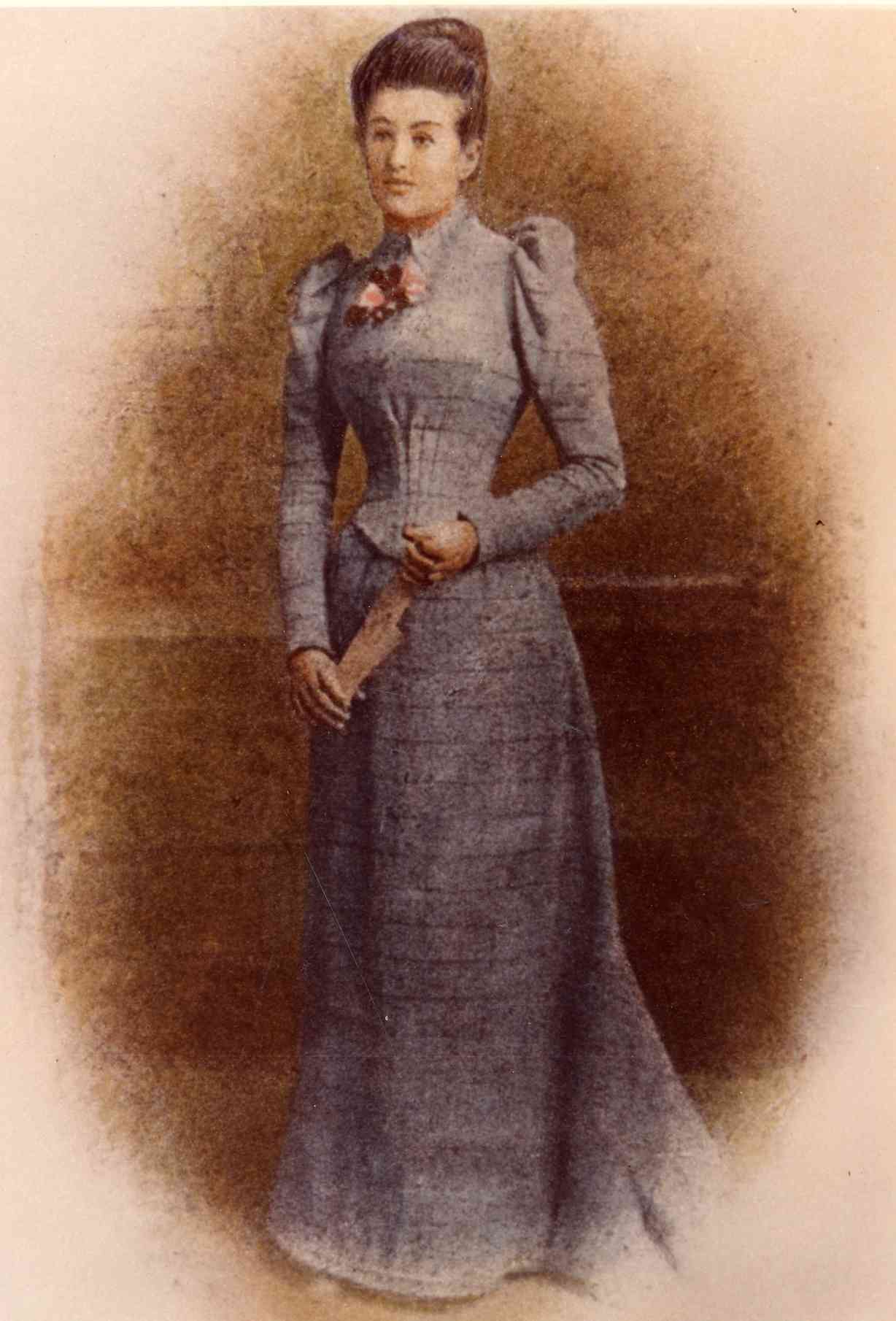 from Tralee, County Kerry. They had five sons and five daughters.
from Tralee, County Kerry. They had five sons and five daughters.
Sadly, two of his sons, Daniel Joseph Sheehan and Martin Joseph Sheehan, were killed while serving in World War I. His other sons, Michael Joseph Sheehan and John F. Sheehan, served in World War II. Another son, Patrick A. Sheehan, became a lawyer.
Most of his family settled in England, except for Patrick, who remained a strong Irish nationalist.
D. D. Sheehan passed away on November 28, 1948, at the age of 75, while visiting his daughter in London. He was buried with his wife at the Glasnevin National Cemetery in Dublin, Ireland.
Images for kids
 | Kyle Baker |
 | Joseph Yoakum |
 | Laura Wheeler Waring |
 | Henry Ossawa Tanner |


